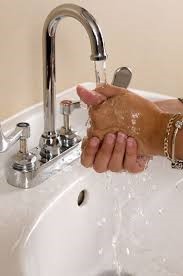 Washing your hands is easy, and it’s one of the most effective ways to prevent the spread of germs. Clean hands can stop germs from spreading from one person to another and throughout an entire community.
Washing your hands is easy, and it’s one of the most effective ways to prevent the spread of germs. Clean hands can stop germs from spreading from one person to another and throughout an entire community.
Wash hands:
- Before, during, and after preparing food
- Before eating food
- Before and after caring for someone at home who is sick with vomiting or diarrhea
- Before and after treating a cut or wound
- After using the toilet
- After changing diapers or cleaning up a child who has used the toilet
- After blowing your nose, coughing, or sneezing
- After touching an animal, animal feed, or animal waste
- After handling pet food or pet treats
- After touching garbage
Follow these five steps every time.
- Wetyour hands with clean, running water (warm or cold), turn off the tap, and apply soap.
- Latheryour hands by rubbing them together with the soap. Lather the backs of your hands, between your fingers, and under your nails.
- Scrubyour hands for at least 20 seconds. Need a timer? Hum the “Happy Birthday” song from beginning to end twice.
- Rinseyour hands well under clean, running water.
- Dryyour hands using a clean towel or air dry them.
Source: Centers for Disease Control and Prevention and K-State Research and Extension Rapid Response Center
By: Ashley Svaty
 Germs can enter your body through your nose, mouth, and eyes and make us sick. Washing your hands with soap and water for at least 20 seconds removes germs from hands and helps prevent sickness. The CDC states that studies have shown handwashing can prevent 1 in 3 diarrhea-related sickness and 1 in 5 respiratory infections, such as a cold or the flu. Handwashing helps prevent the spread of germs that can be transferred to others by dirty door knobs, tables, toys, etc.
Germs can enter your body through your nose, mouth, and eyes and make us sick. Washing your hands with soap and water for at least 20 seconds removes germs from hands and helps prevent sickness. The CDC states that studies have shown handwashing can prevent 1 in 3 diarrhea-related sickness and 1 in 5 respiratory infections, such as a cold or the flu. Handwashing helps prevent the spread of germs that can be transferred to others by dirty door knobs, tables, toys, etc. Regular handwashing for at least 20 seconds with soap and running water is one of the best ways to remove germs, avoid getting sick, and prevent the spread of germs to others. Use a hand sanitizer or hand wipe only if soap and water are not available.
Regular handwashing for at least 20 seconds with soap and running water is one of the best ways to remove germs, avoid getting sick, and prevent the spread of germs to others. Use a hand sanitizer or hand wipe only if soap and water are not available.